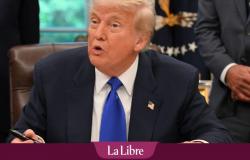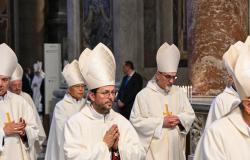In the United States, in the name of religious freedom, it will now be increasingly difficult, if not impossible, to criticize religions.
The place of religion in society and in institutions increases. To the point where it is possible to speak of a risk of inquisition.
In recent days, two new decrees signed by Donald Trump have significantly compared the United States of a theocracy, a project caressed by religious fundamentalists of any ilk.
The first decree, International prayer dayencourages the Statesuniens to a day of prayer every May 1, “in worship, communities and workplaces, in schools and houses”. The text explicitly establishes the need for “faith, prayer and devotion to God”. He makes God responsible for the power of the United States.
This decree could serve as a basis for criminalizing criticism of religions.
Under a deceptive title, the second decree, The establishment of a commission of religious freedomsestablishes the foundations of what could become a new inquisition. The commission which he creates will have to submit a report on what the Trump administration considers attacks on religion and on the strategies to be deployed to defend it. The assumed to refuse vaccination, prohibit the teaching of evolution, censor books or impose prayer moments in schools are part of his mandate.
This second decree opens the door to the supplementation of laws by religious decrees.
Let us recall that the American vice-president JD Vance belongs to a Christian fundamentalist sect which advocates the fusion of state and religious powers, as in the Middle Ages.
Rapport trouble
American citizens have a troubled relationship with religion. On the one hand, the settlers of the Mayflower fled religious persecution, but on the other hand, certain founding fathers of the American Constitution were atheists.
In recent decades, the proportion of atheists and agnostics in the United States has increased until about one third of the population. But roughly no elected official claims to belong to so -called “without religion” voters.
Conversely, almost 30% of the American population identifies with evangelical churches, a fundamentalist religious movement whose followers vote 80% for Donald Trump.
In religion as in other fields, American society is polarized.
White house control
In February, Trump appointed Paula White, a televangelist, at the head of an office of the faith, an entity responsible for inserting religious questions in all the activities of the White House.
Trump also set up a strike force responsible for fighting against the supposed anti -religious bias. This force is mainly composed of Christian nationalists, conservatives and oligarchs who already control the Republican Party.
As Benito Mussolini has shown, fascism and religion are not incompatible, one that can be used to legitimize the other.








